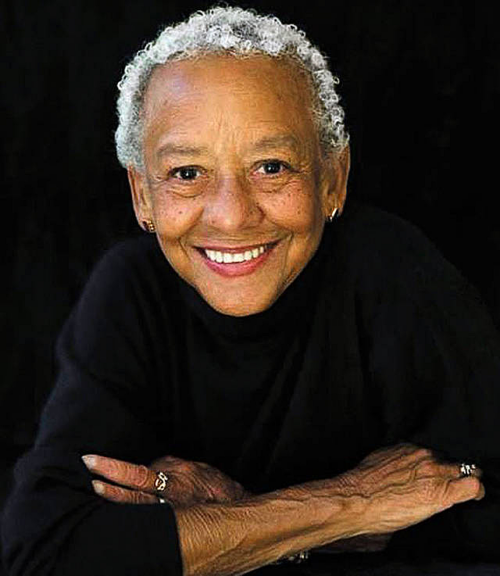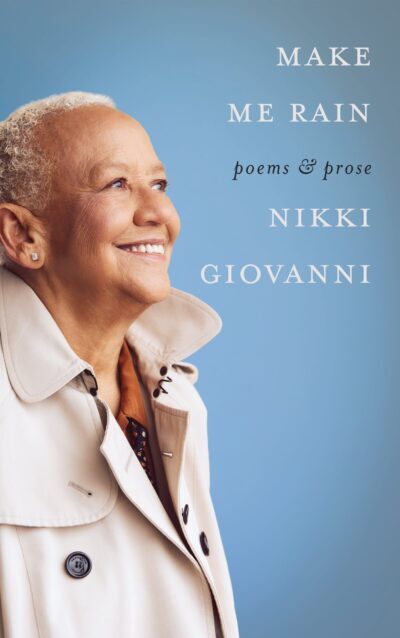Poetess supreme and civil rights legend Nikki Giovanni’s fiery and lyrical voice was silenced on December 9th of last year at the age of 81. Nikki truly helped to empower generations with her fearless words and unwavering advocacy for our people. We had the honor of interviewing her back in 2021 and thought we’d share the feature with you once again.
Rest in power, Nikki! You will truly be missed!
During challenging times, there are souls who are predestined to carry out the work necessary to move humanity forward. They come as parents, teachers, educators, poets, writers, artists, and of course, activists. Having no time for game playing, they shine a light on a pathway that many are inspired to follow. Nikki Giovanni is a celebrated poet, writer, educator, and courageous soul.
For over five decades, Nikki has been instrumental in shaping the direction of contemporary Black American poetry. The creative’s poems have touched the hearts of countless folks globally with their multi-faceted ability to inspire us to action, make us think critically, or shed some much-needed light on our individuality and interconnectedness.
Born in Knoxville, TN., Nikki was raised in Cincinnati. The 77-year-old icon is the author of 29 books, including children’s literature. Nikki’s many awards and honors include: Seven NAACP Image Awards, The Rosa Parks Quiet Courage Award, The Gwendolyn Brooks Poetry Award, The Ohio Women’s Hall of Fame, The Langston Hughes Medal, and she was named one of Oprah Winfrey’s 25 Living Legends.
The poetess also received a Grammy Award nomination for Best Spoken Word Album, The Nikki Giovanni Poetry Collection. A graduate of Fisk University, Nikki is currently a University Distinguished Professor in the Department of English at Virginia Tech in Blacksburg, Virginia.
A revolutionary poet during the turbulent civil rights era of the 60s, Nikki was fueled by the times. She stood at the forefront of the Black Arts Movement along with fellow creatives Amiri Baraka, Sonia Sanchez, Haki Madhubuti, and others. Nikki self-published her first book Black Feeling, Black Talk, Black Judgement, in 1967 and a year later, Black Judgement; both books helped her gain considerable stature. In addressing the work Nikki accomplished during the 60s, she says, “Our generation did what they had to do, and that was to get rid of segregation…. We did that for our grandmothers.”
Whether reading Nikki’s latest book, Make Me Rain, or enjoying her other popular books that include: A Good Cry, Chasing Utopia, or Love Poems, readers will find her words to be riveting and inspiring. She is an honest seer who is gifted with writing about what’s familiar. Politically, Nikki implores us never to forget the incredible contributions of Black people in this country and how we must continue the work of uplifting and uniting our race.
I first met Nikki Giovanni in the 90s when I was the poetry editor of Essence; the magazine had hosted a special luncheon in her honor. In 2003, we co-judged a poetry slam contest held in New York City. There, I had the rare opportunity to talk more in-depth with Nikki. I also attended both the 1994 and 2004 Furious Flower Poetry Conferences, where Nikki was a guest speaker.
The last time I saw Nikki was at the Apollo Theater in March 2019 for a special program, A Legendary Conversation. She was interviewed by Dr. Johnnetta B. Cole and the event sponsored by their sorority Delta Sigma Theta.
It was an honor to converse with the great Nikki Giovanni and share her insights and wisdom with our 50BOLD readers.
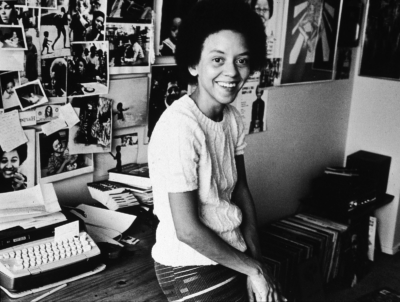
50BOLD: I know how much you love history. Even in your poetry, you provide us with inklings of history, as evidenced in your poem “Ego Tripping.” It is one of my favorite poems. I love how you provide us with teachings in the poem, particularly in the lines that read:
I walked to the fertile crescent and built the sphinx
I designed a pyramid so tough that a star
that only glows every one hundred years falls
into the center giving divine perfect light
I am bad
You have stated how you teach through your poetry. I have the “Ego Tripping” CD and love its arrangement with drums, the call, and response. This generation is also discovering and enjoying the poem. How do you feel about this discovery?
Giovanni: I am really very, very pleased because it’s like reading a poem of Countee Cullen, even though there’s no more segregation. And Maya helped to keep Paul Laurence Dunbar alive with “I Know Why the Caged Bird Sings.” And we know that in another kind of way we are all caged birds…. We continue to read poetry, and that’s what’s important.
50BOLD: I want to acknowledge all of your generation’s work during the 60s with the civil rights and the Black Arts Movements. It was all about action and obtaining solutions, like Stacey Abrams’ incredible work in Georgia.
Giovanni: That’s creation! That’s action! That’s real action! We fought for the right to vote, but she [Stacey Abrams] organized, and we ended up getting two senators. I think Stacey is incredible. And, of course, I’m just in awe of Black Lives Matter because it is global. It is a global situation. We were civil rights, and people really appreciated it…. Black Lives Matter has gone global. And all of us who are of color, whether we’re in Australia, which I couldn’t believe that Perth, Australia was actually marching with us to protest the death of George Floyd. So, every generation takes another step.
50BOLD: In your new book Make Me Rain, “Vote” is a powerful poem addressing the importance of participating in our elections. The party that lost the 2020 presidential election recently launched a campaign across America to enact drastic changes to voting rights; how can we prevent this from happening?
Giovanni: It’s not going to happen, and we’re going to continue to fight. We, who care about democracy, one of the things we’re going to do in ’22 is get rid of a lot of republicans. And that’s what they are afraid of, but it’s going to happen. And they’re not all in Mississippi. They’re not all in Georgia. They have to be gotten rid of. And if I were betting, I would bet on us; I would bet on the Democrats and the Independents.
50BOLD: Looking at the work of the Black Arts Movement that was one of the most influential political movements of the time, do you think Black Lives Matter is continuing your generation’s work?
Giovanni: When you mentioned the arts, one of the things we did that was important was to organize everybody. We were writing our own poems, and we were reading. We were making things happen. And one of the things with Black Lives Matter is that people keep saying you ought to have an office, and you ought to have phone numbers.
I know that the girls of today are too smart. If they had an office, it would have been blown up by now. They’re very smart and are not playing damn games! They are going to make things happen but are not going to be targeted. They are not! They are just going to go on and do their work. And I love it. Every day, I just love it!
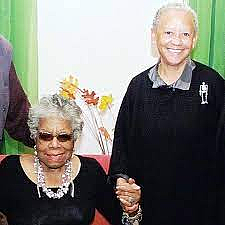
50BOLD: Sometimes, I wonder if some are trying to stop what Black Lives Matter is trying to accomplish.
Giovanni: They’re not going to stop them. They’re going to go forward as we did. And when they outlawed the drum, we began to clap our hands. And when they outlawed that, we snapped our fingers. And when they outlawed that, we learned to tap. We have continued to go forth. I have no question that Black Lives Matter will not be stopped. When moving to be free, we also thought that the spirituals would go, but then the gospels came in, and then jazz came in, and then the blues came in. We are a resilient people. And so, there’s no question in my mind that something else is coming. But we have to remember what came before.
50BOLD: What would you say is the role of the poet and the writer during these times?
Giovanni: Well, I think that all artists do what we can do. And in all fairness to everybody, our role is no different from any other athlete, any other teacher, or any other librarian. We’re here to see what we can do, to tell the truth as we know it and understand it.
50BOLD: You were a great fan of Tupac Shakur. Some say he was about to make positive changes, which is probably why he was killed.
Giovanni: Pac was a force for positivity all the while. He would get on stage and say, ‘Now ya’ll got to vote.’ He had a tattoo I loved across his stomach that read Thug Life. I have one that showed Afeni [Tupac’s mother] we all mourned her son’s death. We knew Afeni, his influence, and that’s important. And this is why Pac was killed, not for changes he was going to make, but for what he was already doing.
50BOLD: There was really no one else like Pac unless you go way back.
Giovanni: Unless you go way back to somebody like Malcolm X. With that voice, Pac was finding a way to bring people in, and that’s why he was killed.
50BOLD: By the way, I enjoyed your poem that is also the title of your new book, Make Me Rain. The poem reminded me about the mysteries of water I’ve read about and how it possesses a kind of healing power. Did you ever hear about this supposed scientific fact?
Giovanni: I know the power of water. With water, you can go a long time. Now, I don’t know if you’re a Christian; you don’t have to answer, but if you just go back to Jesus, spending 40 days and 40 nights in the desert. He didn’t need food. What he had was water. Wherever you are, you can take a vase, fill it with water and just put anything in it like a weed, and watch it grow. Water is essential to life.
I believe that poets quite some time ago actually started talking about water on Mars. We kept saying there’s water on Mars. Scientists were laughing and denying the existence of water on Mars. And what did we find out? There’s water on Mars! And at the International Space Station and we can grow food there because we have water. We don’t need soil. We need water.
Water is essential. And I like the poem “Make Me Rain” so much because water constantly changes as people do. Water can be wet, frozen, or like snow. Water can be any number of things. But my favorite line in the poem is “a dance on your windowsill” because it’s such a nice sound when water hits against the windowsill.
50BOLD: Is there anything you’d like to share with us about your dear friend Toni Morrison?
Giovanni: We were friends. Toni and I liked to laugh about the fact that we could spend the afternoon together, have lunch, and not say three words to one another because we gave each other comfort. And I’ve always liked what she thought about benches, so I wrote “A Bench for Toni Morrison,” and it’s in Make Me Rain. I wrote that everybody needs a bench and thought it was a good idea. At first, I saw it as a physical. It’s one of those things you have to smile about and say, ‘oh, that’s a metaphor.’
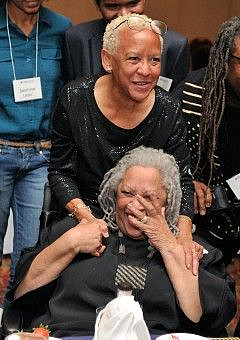
50BOLD: You were also a close friend of Maya Angelou. She was on Oprah once, and they were discussing aging. Maya said the 60s were good, and the 70s were even better. It appears that as we age, hopefully, we tend to get better, accomplish more, and know who we are. How do you feel about aging?
Giovanni: I think it’s great, and if I may use this term, a great idea. I would encourage aging exactly for the reasons you’re saying; the house is paid for. You don’t want another car, at least, I don’t. And the dog has her shots. Well, if you have these three things and your fishpond, what more are you asking for?
We’re living in a world where we’re encouraged to be thin. And I think those are not the best ideas. You have to be young because you don’t have any other way to get old. And you’ve got to add a little fat on the bones.
I’ve been trying to gain weight because you know I had cancer. And my doctor’s trying to get me to gain ten pounds. And I don’t know what they tell you, but the hardest thing to do is gain weight. They say losing weight is hard. Losing weight is a piece of cake! And I am lucky I like pig feet, hog maws, chitterlings, and the things that make you fat.
50BOLD: What about this COVID-19 pandemic? I think we must get in touch with the inner guidance that helps us get through challenging times. Do you agree?
Giovanni: Yes, I could agree because something got us through two hundred years. And something got us through with sanity. And that is something people forget about. A lot of people are crazy today, but somehow, we try to remain sane and lean on everlasting arms.
50BOLD: There is a young brother in prison who loves your work. He is a published poet who says your work has helped him cope with his situation. He wanted me to ask, do you think there will be a revolution in the future?
Giovanni: I think we are seeing somewhat of a revolution because people are continuing to fight as we see in young women like Stacey Abrams. I write to a few men in prison, two are young, and one is older. I don’t know why they’re not fighting back. Why they’re not demanding their right to vote. Why they’re not taking the steps that need to be taken. There are people in prison who should not be there, but I don’t know who should be. We hear people say, ‘well, he was in prison, but he was innocent,’ well, I don’t know who isn’t. These are our citizens, and I would like to see more brotherhood in prisons. That would be one hell of a good revolution.
50BOLD: I was surprised to see how fast COVID-19 swept through the prison system.
Giovanni: Remember the Trail of Tears? We had beaten the Cherokees and were pushing them west. And what did we give them as winter came? What was in the blankets?
Smallpox! How can you be surprised? That’s what these people have done. And nobody cares about the guards. Nobody cares about prisoners. They don’t. The guards need to understand that nobody cares about them. They’re not doing anything but the dirty work. Nobody cares if they all drop dead.
If you wake up one morning and all the prisoners and guards are dead, nobody would care. And the guards say, well, I’m white. Well, I don’t think you’re white enough!
50BOLD: What do you think about the situation that is taking place involving the immigrants on the U.S.-Mexican border?
Giovanni: We have so much work that needs to get done. We need to make use of our people who are in prison. We need them out and working in the inner city. They need to be cleaning up the city. And secondly, we need to look at the Latino people. Let these young men and women come into this country; give them a living wage. And everybody’s like, well, I don’t know, $15? You’re not rich off $15!
They’re not taking any jobs. These women are getting up in the morning, leaving food for their babies and then, going out to try and earn a living. These people need to work so let them in. Invite them in. This is a nation of immigrants. Let them in, and let’s get on with it.
50BOLD: Is there anything new that you are working on?
Giovanni: My book that I’m kind of working on but not actually, it’s what I’m now calling on my computer, the New Book. I’ve done A Good Cry and Make Me Rain. I had these poems floating around on my computer screen, so I placed them in a folder. I’m picky, and everything has to be neat. So, I put the poems in a folder, thought about what to call it, and came up with The New Book. I’ve been building on the book, but it will be a while because Make Me Rain just came out.
50BOLD: Is there anything else you’d like to convey to our readers?
Giovanni: Well, just that life is a good idea. I want to remind, especially young people, not to let Facebook, Twitter, and all social media stuff wear them down. This younger generation has the highest suicide rates. They tend to fall for the pretend stuff they see on social media sites. Life is truly a good idea. Those people who go to these sites to brag about what a great life they’re having, well, if all is so great, how come they have so much time to post stuff? Life is enjoyable, so enjoy it! It’s a good idea.
NOTE: The Black Arts Movement had an indelible impact on the country’s cultural landscape and particularly on the development of African American literature. If you want to learn more about the significance of this amazing movement, read: SOS–Calling All Black People edited by John H. Bracey Jr., Sonia Sanchez, and James Smethurst.
The Furious Flower Poetry Conference is a revolution of consciousness held every ten years with many Black Arts Movement scholars and writers in attendance. The next conference will be held in 2024. For more info, visit Furious Flower


